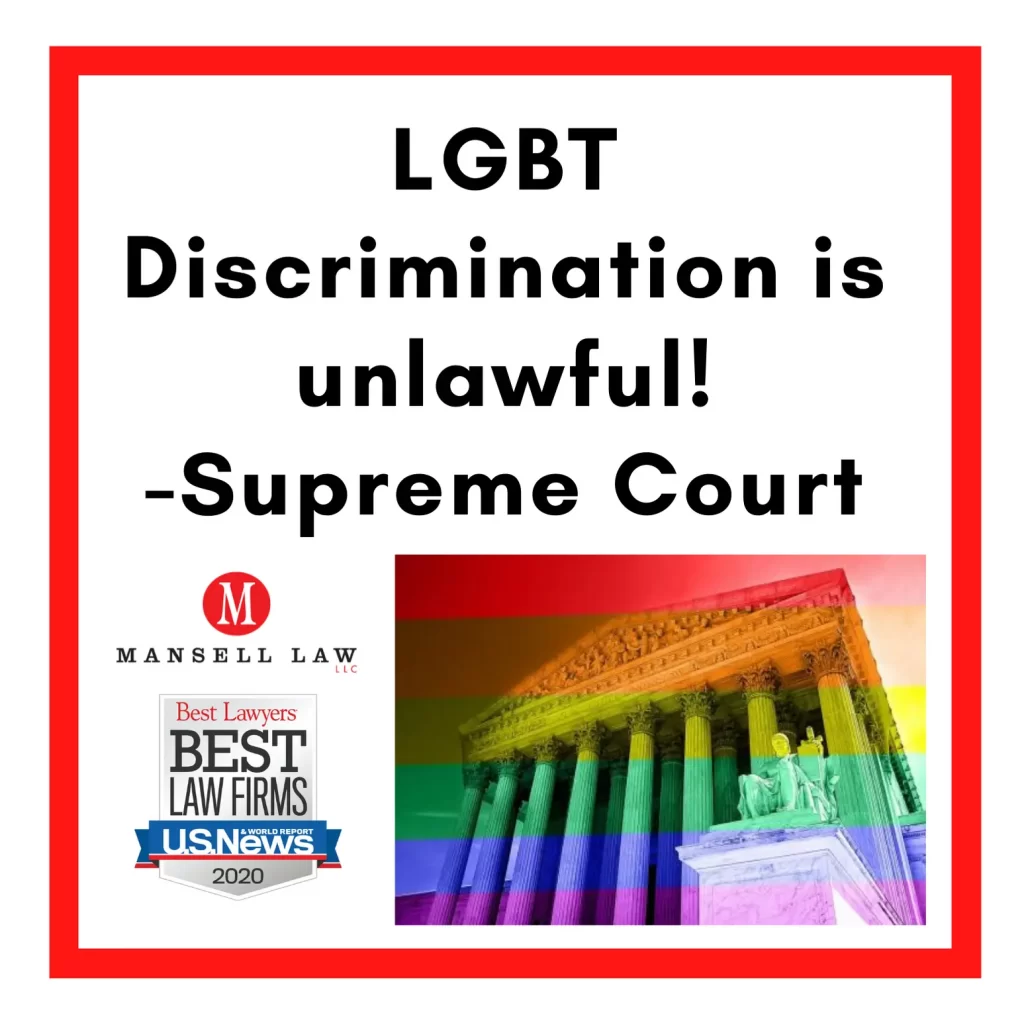U.S. Supreme Court Holds LGBT Discrimination in the Workplace is Unlawful.
Firing Gay, Lesbian, or Trans Employees Based on Their Sexual Orientation or Gender Identity is Unlawful Under Title VII!
On June 15, 2020, the United States Supreme Court published its decision in Bostock v. Clayton County, Georgia, a landmark case for LGBTQ employees. The Court held that employment discrimination based upon an employee’s sexual orientation or gender identity is unlawful under Title VII of the Civil Rights Act of 1964. This decision is a major victory that will extend protection against employment discrimination to millions of LGBT workers throughout the United States.
Title VII: The Basics on Anti-Discrimination Laws
Title VII of the Civil Rights Act of 1964 prohibits employment discrimination based on an employee’s membership in a “protected class.” Protected classes under Title VII include sex, race, national origin, color, and religion. The Americans with Disabilities Act (ADA), Age Discrimination in Employment Act (ADEA), and Uniformed Services Employment and Reemployment Rights Act (USERRA) also protect against employment discrimination based on disability, age, and military membership, respectively.
However, until June 15, 2020, two categories that were notably absent from this list of protected classes under Title VII were sexual orientation and gender identity. This meant that LGBT employees were not protected from discrimination in the workplace; they could be fired merely because of their sexual orientation or gender identity.
The Circuit Split
State courts and lower federal courts have heard countless arguments regarding why Title VII’s protections should be extended to include sexual orientation and gender identity. Some courts have been persuaded, but some have not. Since lower federal courts’ jurisdiction is limited to certain areas of the country, the question of whether employees were protected from employment discrimination based on their sexual orientation resulted in a different answer throughout the United States.
In some areas, sexual orientation was already considered a protected class. However, in most states (including Ohio), sexual orientation was NOT considered a protected class; employers could discriminate against employees based on their sexual orientation and face no legal repercussions.
For the majority of employees in the United States, the only form of legal protection against discrimination based on sexual orientation or gender identity came from the protections against sex stereotyping and gender non-conformity – both subsets of sex discrimination claims under Title VII. But the law regarding these claims is murky, and often discrimination based on a person’s sexual orientation or gender identity did not fit neatly into either of these categories. From a practical standpoint, most LGBTQ employees had little to no protection against workplace discrimination. Since the nation was divided regarding how to handle employment discrimination in these situations, the Supreme Court heard oral arguments in Bostock v. Clayton County Georgia to settle the debate.
Bostock v. Clayton County Georgia: The Background Facts
Bostock v. Clayton County Georgia consolidates three separate cases from throughout the country, all of which needed an answer to the same question: can you be fired merely because of your sexual orientation or gender identity? In Bostock, Gerald Bostock worked as a Child Welfare Services Coordinator in Georgia. Mr. Bostock is a gay man, and once he disclosed his sexual orientation to his employer, his sexual orientation was openly criticized. He was falsely accused of mismanaging his department’s funds, and his employment was ultimately terminated due to “conduct unbecoming of an employee.”
The other two consolidated cases were Altitude Express Inc. v. Zarda and R.G. & G.R. Harris Funeral Homes Inc. v. Equal Employment Opportunity Commission. In Zarda, Donald Zarda worked as a skydiving instructor. Skydiving instructors are strapped to the client during skydives, so instructors frequently joked with their clients about the close physical proximity to ease their clients’ fears. On one occasion, Mr. Zarda worked with a female client and joked that he was gay to lessen any uneasiness the client may have felt about being strapped to a male instructor. The client reported Mr. Zarda’s comment about his sexual orientation, and soon after, his employment was terminated.
In R.G. & G.R. Harris Funeral Homes Inc., a transgender woman, Aimee Stephens, worked at a funeral home as a funeral director. When she first started working at the funeral home, Aimee represented herself as male and went by the name of Anthony Stephens. Several years later, after she disclosed her transgender status and her intent to represent herself as female to her employer, she was fired. She was told that her desire and intention to represent herself as a female was “not going to work out.”
In all three of these cases, the employers admitted that they fired the employees because they were gay or transgender. But in all three cases, the employers argued this was permissible, because Title VII does not protect against this kind of discrimination.
The Legal Issue and “Because of Sex”: What Does it Mean?
The main legal issue surrounding whether sexual orientation and gender identity should be included as protected classes under Title VII has to do with the language of the law. Sexual orientation and gender identity were not explicitly listed in the categories of protected classes when Title VII was enacted in 1964. Therefore, opponents of extending Title VII’s protections to LGBTQ individuals argue there is no reason to include it now. Opponents argue that if the meaning and language of Title VII is to be changed, it is up to Congress, not the courts, to do so.
However, proponents of extending Title VII’s protection to sexual orientation and gender identity argue that discrimination based on a person’s sex necessarily includes discrimination based on that person’s sexual orientation or gender identity. The language “because of sex” in the text of Title VII includes sexual orientation and gender identity because a person’s sex will ultimately decide whether discrimination on the basis of sexual orientation or gender identity can occur:
Example: Sam is dating a female. Sam may or may not have a same sex partner; this can only be determined once we determine whether Sam is male or female.
Example: Jordan identifies as female. Jordan may or may not be transgender; this can only be determined once we determine the sex Jordan was assigned at birth.
If an employer fires a male employee for dating males but does not similarly fire female employees for dating males, then the employer is treating its employees differently based on their sex, in violation of Title VII. The same is true for transgender employees: if an employer fires a transgender employee for representing himself as male but does not similarly fire employees assigned the male sex at birth, these employees are also being treated differently based on their sex.
The Decision: A Major Victory for LGBT Employees
On June 15, 2020, the Supreme Court sided with the proponents in a 6–3 decision and held that “an employer who fires an employee for being homosexual or transgender fires that person for traits or actions it would not have questioned in members of a different sex.” The Court reasoned that a person’s sex “plays an unmistakable and impermissible role” in discrimination based upon that person’s sexual orientation or gender identity, so it must be included as a form of discrimination based upon sex that Title VII prohibits. The Court’s decision will, at long last, extend protection against employment discrimination to LGBTQ employees throughout the United States.
At Mansell Law, we believe the Court’s opinion in Bostock is long overdue and applaud the rights of the LGBT community in this country! Everyone should feel free to live their most authentic lives, and we will fight for your right to do so. If you believe you have been discriminated against because of your sexual orientation or gender identity, reach out to us to schedule a free consultation.
Mansell Law – Employment Lawyers
Related Articles:
Everything You Need To Know About The Landmark Lgbtq Case In Front Of The Supreme Court Right Now

